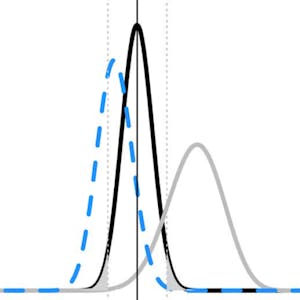This course, offered by Eindhoven University of Technology, is designed to empower learners with the ability to draw better statistical inferences from empirical research. The curriculum covers a wide range of essential topics, including interpreting p-values, effect sizes, confidence intervals, Bayes Factors, and likelihood ratios. Learners will gain insights into experimental design, controlling false positive rates, and determining sample size to achieve high statistical power. The course also delves into crucial aspects of the scientific process, such as publication bias, philosophy of science, theory construction, and cumulative science. Practical assignments provide hands-on experience in simulating t-tests, calculating likelihood ratios, and applying Bayesian statistics. Moreover, the course addresses important concepts like optional stopping, equivalence testing, and open science principles.
Certificate Available ✔
Get Started / More Info
This course comprises eight modules, covering topics ranging from frequentist statistics and Bayesian thinking to philosophy of science, theory construction, and open science principles.
This module provides an introduction to frequentist statistics and Bayesian thinking, allowing learners to build a strong foundation in statistical concepts. Topics include interpreting p-values, understanding type 1 and type 2 errors, and the structure of the course. Practical assignments and quizzes enhance the learning experience.
Learners delve deeper into likelihoods and Bayesian statistics, gaining insights from an interview with an expert in the field. The module covers topics such as binomial Bayesian inference, Bayesian thinking, and practical assignments to apply the acquired knowledge.
This module focuses on multiple comparisons, statistical power, and pre-registration. Learners explore type 1 and type 2 error control, pre-registration processes, and engage in practical assignments to reinforce their understanding of positive predictive value and optional stopping.
Learners gain a comprehensive understanding of effect sizes, including Cohen's d and correlations. The module provides practical assignments to calculate effect sizes, enabling learners to apply the concepts covered to real-world scenarios.
Topics in this module include confidence intervals, sample size justification, and P-curve analysis. Learners learn to interpret confidence intervals, justify sample sizes, and perform P-curve analysis. Practical assignments further reinforce the application of these concepts.
This module delves into philosophy of science, theory construction, and equivalence testing. Learners explore the foundations of scientific theory, the concept of the null hypothesis, and engage in practical assignments to apply equivalence testing principles.
The final module covers replications, publication bias, and open science. Learners gain insight into the importance of replications, the impact of publication bias, and the principles of open science. The module culminates in a comprehensive assignment to apply open science principles.
The final exam module provides learners with the opportunity to test their understanding of the course material, reinforcing their knowledge and skills in statistical inferences and experimental design.
This course equips learners with the skills to plan, design, and analyze experiments effectively, using modern experimental strategies and data analysis techniques....
An Intuitive Introduction to Probability is a comprehensive course offering practical knowledge of Probability Theory, featuring lively, entertaining modules and...
Measurement Systems Analysis provides comprehensive training on analyzing measurement systems for process stability and capability using R software.
"Trees, SVM and Unsupervised Learning" provides a comprehensive understanding of support vector machines, neural networks, decision trees, and XG boost....